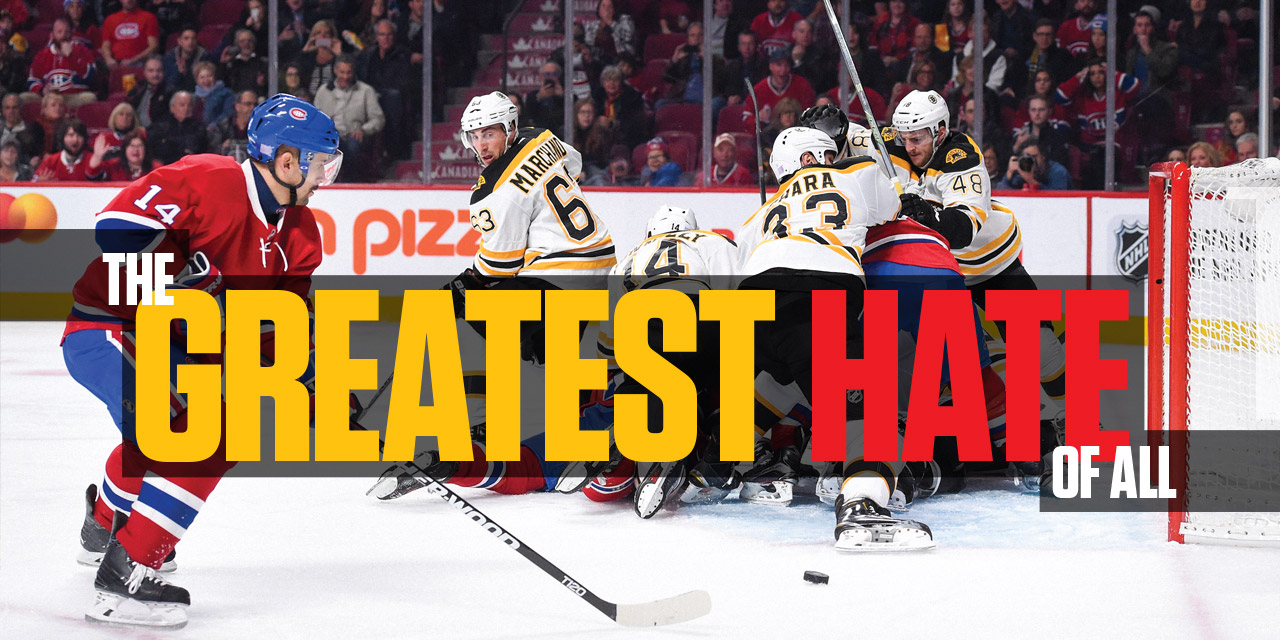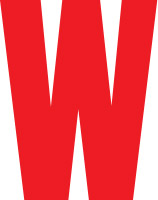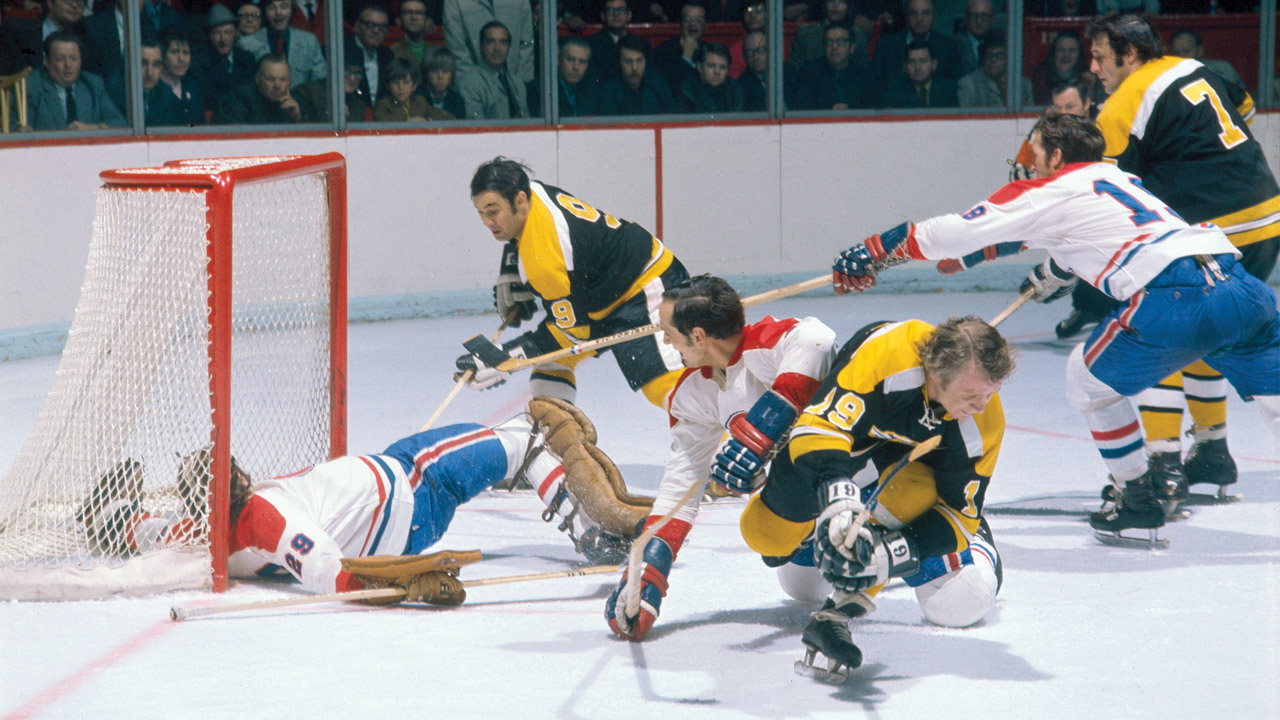
There is no rivalry in hockey more deep-seated or carefully nurtured than that between the Montreal Canadiens and Boston Bruins. It’s about history, identity and the very meaning of the game.
By Ryan Dixon in Montreal
 ith apologies to proximity, rivalries are never better than when the combatants fight what amount to proxy wars for the perceived values of their towns. And the Montreal Canadiens and Boston Bruins—even in an ever-evolving NHL landscape—continue to wage the most prolific and idealistic clash the league has ever known.
ith apologies to proximity, rivalries are never better than when the combatants fight what amount to proxy wars for the perceived values of their towns. And the Montreal Canadiens and Boston Bruins—even in an ever-evolving NHL landscape—continue to wage the most prolific and idealistic clash the league has ever known.
In addition to being the year of the infamous stock market crash, 1929 was the year Montreal and Boston first met in the playoffs. The teams then offered a sign of things to come when they also met in the 1930 and ’31 post-seasons. The rivalry’s zenith came during the 1970s, when both clubs were league powers. Despite the fact that Boston won two Stanley Cups in that decade, it was never able to beat Montreal in a playoff series, a trend that, incredibly, stretched from the late ’40s through the late ’80s, covering 18 post-season matchups. A certain frustration-fuelled animosity helped give life to the New Englanders’ notion that Montreal might win the games, but the real men could be found in black and gold, hiding from nothing and punching anything. The counter-perspective in Quebec was that skill won the day over goonery, giving every fan of what really counts in hockey reason to be happy. Bostonians seethed over a mug of suds; Montrealers celebrated with a glass of rouge.
It didn’t matter that these were, of course, simplistic, exaggerated tropes. The Bruins are the team of Bobby Orr, possibly the most talented player to ever float a foot above everybody on the ice. And Montreal introduced hockey to the enforcer—even if John Ferguson really could play, first and foremost he was there to protect the team’s prince, Jean Béliveau. Still, what would a sports rivalry be without heavy doses of delusion? Even now, in a more sanitized time, the entrenched, fundamental viewpoints continue to rub against one another. If it’s easier to define yourself by what you’re not than what you are, Montreal and Boston both have the benefit of simply pointing to each other. “It’s not just the fringe, crazy, passionate fan that thinks this,” says Mike Johnson, a former Hab who now serves as an NHL analyst. “It’s everyone, top to bottom.”
The haywire emotions of this rivalry first impacted me as a 10-year-old growing up in Southern Ontario in the late ’80s, a misplaced fan of hockey’s most decorated team. References to Montreal’s success—particularly against Boston—were just salt in the wound during my formative years, when the Ray Bourque–led, Cam Neely–fuelled Bruins ran roughshod over the Canadiens, ousting Montreal from the playoffs in four of five seasons between 1990 and 1994. Watching Montreal play on that glorified frozen puddle of an ice surface at the old Boston Garden, you actually felt hope squeezed from your body, the same way Canadiens players, surely, felt a loss of wind each time one of those hard-charging guys named Sweeney crashed them into the boards. Once in a while, you tried to make yourself feel better by viewing video of the Habs carrying the Cup around the Garden after Finals victories in the ’70s. It didn’t work, though, because it was akin to seeing a picture of your grandmother in her teen years; technically, you understand it happened, but even with hard evidence, something about it seems fictional.
The only year Boston didn’t bounce the Canadiens from the big dance was 1993, when Montreal just happened to win its 24th Stanley Cup. But even in the glow of that warm, beautiful summer, you had to avoid looking one hard question in the eye: Would things have gone the Habs’ way if not for the happy circumstance that saw the Buffalo Sabres upset Boston before the Bruins had a chance to haunt our collective dreams again?
The great 1993 “What if?” is usually applied to the Toronto Maple Leafs, who were denied facing Montreal in the Final by a game-seven, home-ice loss to Wayne Gretzky and the L.A. Kings. It must be some kind of commentary on the Canadiens that they’ve managed to be part of two of hockey’s signature rivalries, inspiring two separate fan bases to be sickened by the mere sight of them. Children in both Toronto and Boston have gone to bed for decades complaining to their parents that Montreal can do whatever it wants without ever getting into trouble. Spite has a strong presence in sports, and the horror a Leafs fan would experience watching the Canadiens parade the Cup around—and vice versa—would be unmatched by any other form of despair. Montreal has long been able to smugly deride Toronto because of the latter’s futility, and anything that threatens that dynamic would be an unwelcome development. Which is why we’d suggest more Habs backers were fist-pumping than face-palming when the Bruins stormed back to shock the Buds late in game seven a couple of years ago, while recent playoff battles between Montreal and Ottawa have caused Torontonians to finally discover some affection for Ontario’s other team.
That said, the fact that Montreal and Toronto haven’t played anything more meaningful than a regular-season game since 1979 has, to a degree, dulled the sharpest edges of this conflict. And because these are the ancient franchises of hockey’s home nation, and because their narratives are so entwined with each other and the game in this country, there’s a buried, abstract feeling that these teams are in on something together. “It’s fun in the rink, and the crowd is going back and forth,” says Johnson, a Torontonian who started his career with the Leafs. “But it doesn’t seem quite as passionate, as ready to bubble over on the ice, in the stands, in the media, as Montreal-Boston.”

With the Winter Classic on the horizon, that notion was being parsed before an early-December meeting between the Bruins and Canadiens in Montreal. While his team streamed off the Bell Centre ice following its morning skate, Boston coach—and former Montreal bench boss—Claude Julien stood in front of reporters who, in two official languages, asked if the teams really get up for each other the way they’re made out to. “We do,” he assured them.
Julien understood why the question was being posed. In keeping with the sharp turn hockey has taken toward speed and skill, recent confrontations between Montreal and Boston have seen less of the all-out anarchy that coloured their duels for the previous 80-plus years. And to be clear, when we reference the past, we’re talking about incidents as recent as one in May 2014, when former Boston tough guy Milan Lucic, in a matter-of-fact tone, threatened to take the life of Montreal’s Dale Weise in a handshake line. (Lucic’s exact, forceful words can, naturally, be found in T-shirt form.)
The fact that people can even wonder about the state of this spat is a testament to what it has been. Just like a loving relationship, a hateful one is healthier when both sides put the work in. While Toronto and Montreal’s rivalry has lapsed due to different division alignments and the Leafs being so bad for long stretches, the Habs and Bruins have never stopped seeing each other in the spring. When they had an eight-year gap between playoff showdowns from 1994 to 2002, it felt liked an intermission in which the Zamboni might never stop going around.
Boston, in a slightly juicy twist, has had to become a team that more closely resembles Montreal’s historical identity because of the turn hockey has taken. However, that just means the Bruins stand a better chance of transitioning on the fly and remaining a competitive club after scaling the top of the mountain in 2011. Montreal is trying to reach those championship heights now, and there’s every chance the two clubs’ outdoor meeting on Jan. 1 will serve as a preview for another playoff encounter come April, when the enmity can bubble up again.
Perhaps—as an occasional, not-entirely-agnostic contributor to the coverage—I’m on high alert for such things, but there even seems to be a touch more press-box partisanship when Montreal and Boston are involved. Predictably, the extreme ends of both sides bark into microphones about the other’s shameful actions. Sometimes, though, things can be more nuanced than that. The fact that Montreal’s Tomas Plekanec has a turtleneck peeking out from his equipment has been noted more than once by a respected Boston writer who, I’d guess, is suggesting it’s hard to take seriously a hockey player who shows up wearing something his mom made him wear. An otherwise rational Montreal blogger has been known to move away from reason when any roughhousing by the “Bucking Fruins” takes place. Even if you don’t overtly root for a team in this business, there’s nothing that says the ethos of your city has to be completely set aside.
This story originally appeared in Sportsnet magazine. Photo credits, from top: Francois Lacasse/NHLI/Getty; Denis Brodeur/NHLI/Getty




Almost Done!
Please confirm the information below before signing up.
{* #socialRegistrationForm_radio_2 *} {* socialRegistration_firstName *} {* socialRegistration_lastName *} {* socialRegistration_emailAddress *} {* socialRegistration_displayName *} By checking this box, I agree to the terms of service and privacy policy of Rogers Media.